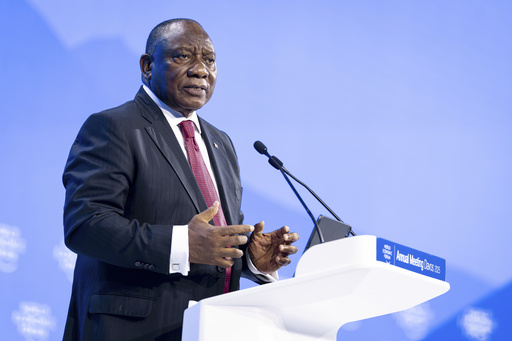
CAPE TOWN, South Africa — In light of recent remarks made by U.S. President Donald Trump regarding the South African government’s land expropriation policies, South African President Cyril Ramaphosa had a conversation with billionaire advisor Elon Musk. This discussion took place a day after Trump announced intentions to cease financial support for South Africa due to the controversial land law, according to Ramaphosa’s spokesperson Vincent Magwenya.
Musk, who is originally from South Africa and has strong ties to Trump, was deemed a logical choice for this conversation, as he had previously engaged in discussions about investment opportunities in the country. The land expropriation law, recently signed by Ramaphosa, has sparked significant debate, as it allows the government to take land from private owners under certain conditions.
On Sunday, Trump made claims about the South African government “confiscating land” and announced that the U.S. would investigate these actions, while providing no specific details about the alleged confiscations. Criticism also arose from Musk, who accused the government of being anti-white and characterized the new law as a deliberate attack on the white minority’s land ownership rights. In response, the South African government described Trump’s statements, including Musk’s comments, as rife with “misinformation and distortions,” prompting the need for Ramaphosa’s outreach to Musk.
The concerns over potential funding cuts from the U.S. are profound, as they could amount to nearly half a billion dollars yearly, predominantly for the U.S.’s extensive HIV/AIDS program in the nation. Currently, South Africa is home to more than 8 million people living with HIV, with about 5.5 million receiving antiretroviral treatment. Approximately 17% of the funding for South Africa’s HIV program comes from the U.S. under the President’s Emergency Plan for AIDS Relief (PEPFAR), which provided $440 million in assistance last year.
The South African government has firmly stated that no land has been taken thus far, countering Trump’s remarks. Even critics of the new land law agree that Trump’s assertions regarding land confiscation are incorrect. Magwenya confirmed that the government intends to promptly address the spread of misinformation and inaccuracies regarding their laws and the overall state of the country. “We were obviously perturbed by the substance of the announcement (by Trump) because there were clearly inaccuracies,” he stated.
Looking toward the future, the South African leadership hopes to engage further with the Trump administration at various levels, particularly with influential figures like Musk. The new land law is designed to address historic injustices stemming from apartheid, enabling the government to target underutilized land while simultaneously safeguarding property rights. This piece of legislation has emerged after prolonged discussions and debates in Parliament, recently signed by Ramaphosa.
Musk has repeatedly expressed his viewpoints against affirmative action in South Africa, even raising claims about the killings of white farmers amounting to “genocide.” While such incidents exist, experts assert they are more connected to the nation’s rampant crime rates rather than a targeted agenda against any specific group. Musk’s suggestions that the authorities discriminate against white citizens have been associated with his business interests, especially as he faces challenges regarding regulatory compliance in South Africa.
In recent communications, Musk criticized South Africa’s affirmative action laws, which mandate the inclusion of Black ownership in certain sectors to address the injustices of the past. This law is part of efforts to amend the legacy of apartheid, which only ended in 1994. After leaving South Africa in the late 1980s for Canada, Musk has continued to comment on matters related to his homeland.
Moreover, Musk’s satellite internet service, Starlink, has been denied a license to operate in South Africa, likely due to non-compliance with the affirmative action criteria. According to Magwenya, the discussions between Ramaphosa and Musk previously included topics surrounding regulatory frameworks and potential investments in South Africa.

